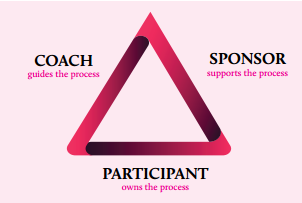The Importance and Benefits of Coaching:
How Executive Coaching Drives Organisational Success
By Lisaan Dipchan - Lead Coach | Mindful Resolutions

LINKAGE Q3 (2024) - OPPORTUNITY IN ADVERSITY .
C
oaching has become an essential tool in the modern business landscape, particularly for leaders, CEOs, team leaders and high-potential employees, and organisations aiming to achieve excellence. By focussing on personal and professional development, coaching offers a strategic advantage that goes beyond traditional training programs. This article will delve into the importance and benefits of coaching, specifically executive coaching, and how it plays a crucial role in helping organisations, leaders, team leaders and team players attain their goals.
UNDERSTANDING EXECUTIVE COACHING
Executive coaching is a pragmatic, individualised professional development process that enhances a leader’s capabilities to achieve short-, medium- and long-term organisational goals. It is geared towards executives, CEOs, managers, team leaders and other high-potential employees. Unlike traditional training programmes, executive coaching is tailored to the unique needs and goals of the individual, providing a customised approach to people development.
It is conducted through one-on-one and/or group interactions, driven by data from multiple perspectives, and based on mutual trust and respect. The more information, effort and commitment is put into the coaching equation, the better the quality of its results, which equates to how successful you are in achieving your goals.
The organisation, an employee, and the executive coach work in partnership to achieve maximum impact. The coach principally works alongside a leader tasked with achieving specific organisational goals in a way that is most suited for the employee while staying within a professional context. The organisation acts as the sponsor of the executive coaching process, and supports the entirety of the procedure. The coachee or participant owns the process and must work alongside the coach, who will guide her or him through the process.

This diagram shows the interconnected relationship between the participant/coachee, the executive coach, and the organisation, highlighting the collaborative effort required to achieve successful outcomes through executive coaching.
Participant (coachee):
· The individual receiving the coaching.
· Focusses on personal and professional development.
· Engages with the coach to set goals, develop skills, and improve performance.
Executive coach :
· Provides personalised guidance and support.
· Facilitates the coachee's self-awareness, goal-setting, and action planning.
· Holds the coachee accountable and offers continuous feedback.
Sponsor/organisation :
· Acts as the sponsor.
· Supports the coaching process by providing resources and aligning it with organisational goals.
· Benefits from the improved leadership capabilities and performance of the coachee.
Ensures that the coaching objectives align with strategic business goals.
What is NOT Executive Coaching
The majority of people misinterprets executive coaching and often thinks it is consulting, mentoring or a variation of training. To fully understand the value of executive coaching, it is important to clarify what it is not:
· Not therapy: While coaching may address personal development, it does not delve into psychological issues or provide therapeutic interventions.
· Not consulting: Coaches do not provide solutions or expert advice on specific business problems. Instead, they work with their clients to co-create solutions specific to their needs.
· Not mentoring: Unlike mentors who share their own experiences and offer guidance, coaches focus on the client's unique context and goals, facilitating self-discovery and growth.
· Not training: Training typically involves the transfer of specific skills and knowledge. Coaching, on the other hand, focuses on developing the individual's overall potential and professional capabilities.
THE TRANSFORMATIVE ADVANTAGES OF EXECUTIVE COACHING FOR INDIVIDUALS
Executive coaching offers a myriad of benefits for individuals, particularly those in leadership roles. One of the most significant advantages is the enhancement of leadership skills. Through personalised coaching sessions, executives can develop critical skills such as strategic thinking, decision-making, communication, and emotional intelligence. These skills are essential for navigating the complexities of leadership and driving organisational success. By focussing on the unique strengths and weaknesses of the individual, coaching helps leaders maximise their potential and become more effective in their roles.
Another key benefit for individuals is increased self-awareness. Executive coaching provides a safe and supportive environment for leaders to reflect on their behaviours, values, and impact on others. This reflective practice leads to a deeper understanding of oneself, which is crucial for personal and professional growth. With greater self-awareness, leaders can identify areas for improvement, set meaningful goals, and develop strategies to achieve them. This process not only boosts their confidence, but also enhances their ability to lead with authenticity and empathy.
Executive coaching also promotes resilience and adaptability. In today’s rapidly changing business environment, the ability to manage and lead through change is essential. Coaches help leaders build resilience by equipping them with tools and strategies to handle stress, setbacks, and uncertainty. This resilience enables leaders to stay focussed and maintain their performance under pressure. Furthermore, coaching encourages a growth mindset, fostering a willingness to embrace challenges, learn from failures, and continuously seek improvement. These traits are vital for sustaining long-term success and career advancement.

A CATALYST FOR ORGANISATIONAL SUCCESS
In the intricate and dynamic landscape of modern business, the pursuit of organisational success necessitates a multifacetted approach that transcends conventional management practices. Among the array of strategies employed by forward-thinking organisations, executive coaching stands out as a transformative tool that catalyses profound changes in leadership effectiveness, organisational culture, and overall performance. The forthcoming delves into the intellectual underpinnings of how executive coaching drives organisational success, highlighting its impact on strategic alignment, leadership development, adaptability, and sustainable growth.
Strategic Alignment and Visionary Leadership
At the heart of executive coaching lies the enhancement of strategic alignment between individual leaders and the overarching goals of the organisation. Executive coaches work closely with leaders to refine their strategic vision, ensuring that it resonates with the company’s mission and long-term objectives. This alignment is crucial as it fosters a cohesive direction and purpose, enabling leaders to steer their teams with clarity and confidence.
Through a process of reflective inquiry and goal setting, executive coaching empowers leaders to transcend short-term operational concerns and embrace a broader, more visionary perspective. This shift from a reactive to a proactive leadership stance is instrumental in navigating the complexities of today’s business environment. By cultivating strategic foresight and decision-making acumen, executive coaching equips leaders to anticipate challenges, seize opportunities, and drive sustainable growth.
Enhanced Leadership Effectiveness
Leadership effectiveness is a critical determinant of organisational success, and executive coaching significantly augments this aspect. The coaching process involves a deep exploration of the leader’s strengths, weaknesses, and behavioural patterns. By fostering self-awareness, executive coaching enables leaders to recognise and mitigate their blind spots, thereby enhancing their overall effectiveness.
Moreover, executive coaching emphasises the development of key leadership competencies such as emotional intelligence, advanced communication skills, and conflict resolution. These skills are indispensable for fostering a positive organisational culture and building high-performing teams. Leaders who exhibit emotional intelligence are better equipped to understand and manage their own emotions, as well as those of their team members. This capability fosters trust, collaboration, and a supportive work environment, all of which are essential for organisational success.
Fostering a Culture of Continuous Improvement
A defining characteristic of successful organisations is their ability to adapt and evolve in response to changing market conditions and internal dynamics. Executive coaching fosters a culture of continuous improvement by instilling a growth mindset in leaders. Coaches encourage leaders to embrace feedback, learn from failures, and view challenges as opportunities for development. This mindset not only enhances individual resilience but also permeates throughout the organisation, creating an environment where innovation and improvement are valued and pursued relentlessly.

Executive coaching also plays a pivotal role in succession planning and talent retention. By identifying and nurturing high-potential employees, coaching ensures a steady pipeline of capable leaders ready to assume critical roles. This proactive approach to leadership development mitigates the risks associated with leadership transitions and maintains organisational stability. Furthermore, organisations that invest in the professional growth of their leaders signal a commitment to employee development and well-being, thereby enhancing employee engagement and loyalty.
Driving Sustainable Organisational Performance
The ultimate measure of executive coaching’s impact is its contribution to sustainable organisational performance. By enhancing leadership effectiveness, fostering strategic alignment, and promoting a culture of continuous improvement, executive coaching drives tangible improvements in organisational outcomes. Leaders who have undergone coaching are better equipped to set and achieve ambitious goals, inspire their teams, and navigate the complexities of the business landscape.
Moreover, the benefits of executive coaching extend beyond individual leaders to encompass the entire organisation. Improved leadership translates into better decision-making, more effective team dynamics, and a stronger alignment with the organisation’s strategic goals. This holistic improvement in organisational capability drives enhanced performance across all levels of the company.
CONCLUSION
In conclusion, executive coaching provides a transformative expedition and serves as a powerful catalyst for organisational success by enhancing leadership effectiveness, fostering strategic alignment, and promoting a culture of continuous improvement. By investing in the development of their leaders, organisations can navigate the complexities of the modern business environment with greater agility and resilience. The intellectual rigor and strategic foresight imparted through executive coaching empower leaders to drive sustainable growth and achieve long-term organisational success. As the business landscape continues to evolve, the role of executive coaching in shaping visionary, adaptive, and high-performing organisations will only become more critical.
ABOUT THE AUTHOR

Lisaan Dipchan is the Lead Coach at Mindful Resolutions.